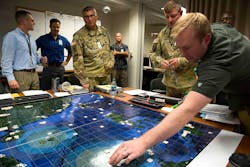BAE Systems to tackle computer-generated battle planning that sets up military engagements at machine speed
WRIGHT-PATTERSON AFB, Ohio – U.S. military researchers needed a company to develop enabling technologies for computer-aided battle planning systems, which perform as well as humans but work at machine speed. They found their solutions from BAE Systems.
Officials of the U.S. Air Force Research Laboratory at Wright-Patterson Air Force Base, Ohio, announced an $8.3 million contract last month to the BAE Systems Electronic Systems segment in Nashua, N.H., for the Strategic Chaos Engine for Planning, Tactics, Experimentation and Resiliency (SCEPTER) program. The Air Force Research Lab awarded the contract on behalf of the U.S. Defense Advanced Research Projects Agency (DARPA) in Arlington, Va.
The SCEPTER computer-generated campaign-scale planning and analytics project is asking BAE Systems experts to develop analytic engines that will produce machine-generated strategies that can compete with humans in the planning of real warfare as evaluated within trusted simulation environments.
SCEPTER seeks to help BAE Systems discover new courses of action by exploring complex military engagements at machine speed. Enabling high speed will come from tailorable abstraction of trusted expert-informed models. Researchers will validate a few of the best performing solutions in high-fidelity trusted simulators and with thorough human review.
The SCEPTER program's first phase will address two key technical focus areas: developing unscripted goal-oriented agents able to discover relevant and interpretable solutions; and managing growth of threats to achieve fast exploration of large-scale military scenarios.
SCEPTER is planned as a two-phase three-year battle planning program. BAE Systems is working only on the 18-month first phase. The Phase 2 program will be classified. DARPA researchers say they plan to spend $39 million on the SCEPTER program over the next three years.
On this contract BAE Systems will do the work in Nashua, N.H., and should be finished by May 2024. For more information contact BAE Systems Electronic Systems online at www.baesystems.com, the Air Force Research Laboratory at www.afrl.af.mil, or DARPA at www.darpa.mil.
About the Author
John Keller
Editor-in-Chief
John Keller is the Editor-in-Chief, Military & Aerospace Electronics Magazine--provides extensive coverage and analysis of enabling electronics and optoelectronic technologies in military, space and commercial aviation applications. John has been a member of the Military & Aerospace Electronics staff since 1989 and chief editor since 1995.
